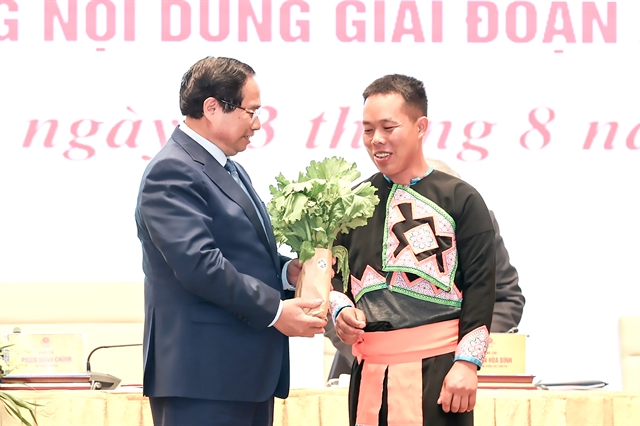 Society
Society

 |
| Vừ A Ly (right) gives organic vegetables from his own production model to Prime Minister Phạm Minh Chính. — VNA/VNS Photo Viết Tôn |
Viết Tôn
SƠN LA — Vừ A Ly’s family, like many others in the mountains, used to rely on traditional farming methods such as growing maize, resulting in low yields and unstable incomes. Young people like him often struggled, unsure which direction to take to start their careers and improve their lives.
Ly hails from Hang Chùng Village, Vân Hồ Commune, Sơn La Province – a remote mountainous area predominantly inhabited by the Mông ethnic community.
Thanks to the National Target Programme for Socio-Economic Development of Ethnic Groups and Mountainous Areas for the 2021–30 period, phase one (2021–2025) – known as Programme 1719 – along with support policies for start-up and livelihood development for ethnic youth, the 32-year-old's life and that of his entire village have truly changed.
In 2021, Ly was fortunate to attend a start-up training course organised by the Committee for Ethnic Groups Affairs (now the Ministry of Ethnic Affairs and Religion), in cooperation with the World Bank. There, for the first time, he became familiar with organic agricultural production and organic farming, as well as the demand for organic vegetables in major cities.
Ly was guided in vegetable cultivation techniques according to Vietnamese Good Agricultural Practices (VietGAP) standards, connected with cooperatives and supported with preferential loans under the Government’s Decree 28.
He has since built a house and installed a drip irrigation system.
Business
Starting from an empty-handed situation with just over 5,000sq.m of hillside land, Ly boldly experimented with vegetables such as celery, spinach, lettuce and herbs, following an organic model.
Initially, he faced many difficulties due to a lack of experience and unstable market outlets. Some harvests failed to cover costs and some years suffered total loss due to natural disasters such as floods and hail.
Ly overcame these challenges step by step with the support of agricultural experts, the local Farmers’ Association and especially the Northwest University’s Support Centre for Ethnic Youth Start-ups, as well as the Committee for Ethnic Groups Affairs.
Ly was assisted in introducing his products at organic agricultural supply-demand connection fairs in Hà Nội.
He has since found stable business partners and expanded production to a total area of 30 hectares.
He established the Hang Chùng Organic Vegetable Production Cooperative, linking 20 households in Mộc Châu, Mai Sơn and Vân Hồ communes of Sơn La Province.
His model has created regular jobs for more than 20 local workers, with an average income of VNĐ7-10 million (US$260-380) per month per person.
Ly’s family has not only escaped poverty but also become prosperous. Each year, they supply approximately 100 tonnes of organic vegetables to mini supermarkets and organic agricultural product stores in Hà Nội, gradually building the 'Pat Ly Organics' brand right in their homeland.
Proposal
Reflecting on his journey, Vừ A Ly expresses gratitude to the Party and State, especially Programme 1719, which supports start-ups by paving the way, inspiring and helping ethnic youth realise their entrepreneurial dreams.
Practical and appropriate policies – from infrastructure such as electricity, roads, schools and health stations, to educational support, vocational training, preferential credit and product marketing assistance – have transformed the lives of people in mountainous areas.
He said: “We, the people on Vân Hồ highland, feel very fortunate to have the Party and State leaders who care and dedicate a special national target programme for ethnic groups, helping us overcome difficulties and move forward.”
Ly believes that when people speak of start-ups, many may think of billion-đồng projects or million-dollar models. But for ethnic youth, simply daring to think, boldly doing business, creating jobs and developing sustainable livelihoods to care for their families, relatives and community, lifting them out of poverty towards a stable life, is already a success.
Based on his own experience, Ly hopes the Party and State will continue to maintain and expand support models under Programme 1719, issue policies specifically for ethnic youth start-ups and employment, and see market outlets for agricultural products from ethnic minority areas.
He also suggests greater assistance for transport infrastructure, cold storage, packaging and delivery.
Ly believes that with such support, people in highland areas will better develop their livelihoods from local forests and rice fields.
He hopes the Ministry of Ethnic Affairs and Religion will create a shared platform for information exchange and learning and, if possible, establish a dedicated Start-up Fund for ethnic youth to encourage innovation, daring ideas and bold action.
He feels he not only represents Mông youth but also embodies the dreams of transforming the lives of the entire ethnic young generation.
Ly says he no longer wishes to be “a beneficiary of State policies” but aims to become a key force in economic development, cultural preservation and protecting his homeland as well as the country. — VNS




